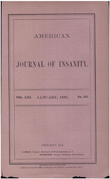Patterns of personality disorder comorbidity in early-onset versus late- onset major depression
Abstract
OBJECTIVE: This study tested the hypothesis that in a population of adult outpatients with major depression, those with an early onset of depression would have a greater prevalence of personality disorders than those with a late onset of depression. METHOD: The 404 subjects were patients participating in depression treatment studies at the Massachusetts General Hospital. They were administered the Structured Clinical Interview for DSM-III-R-Patient Version to assess the current presence of major depression and the age at onset of the initial depressive episode. The subjects were then divided into two groups: those with early onset (before 18 years of age) and those with late onset (at age 18 or later). The prevalence of personality disorders was determined through use of the physician-rated Structured Clinical Interview for DSM-III-R Personality Disorders (SCID-II) and the patient- rated Personality Diagnostic Questionnaire-Revised (PDQ-R). RESULTS: The patients with early onset of major depression had a significantly higher prevalence of avoidant, histrionic, narcissistic, and borderline personality disorders according to the SCID-II. The PDQ-R scores indicated that avoidant, dependent, passive-aggressive, histrionic, narcissistic, borderline, and antisocial personality disorders were significantly more prevalent among the patients with early onset of major depression. CONCLUSIONS: Overall, the results are consistent with the view that early-onset depressive illness is distinguished from late- onset major depression by more frequent association with persistent disturbances in behaviors and attitudes.
Access content
To read the fulltext, please use one of the options below to sign in or purchase access.- Personal login
- Institutional Login
- Sign in via OpenAthens
- Register for access
-
Please login/register if you wish to pair your device and check access availability.
Not a subscriber?
PsychiatryOnline subscription options offer access to the DSM-5 library, books, journals, CME, and patient resources. This all-in-one virtual library provides psychiatrists and mental health professionals with key resources for diagnosis, treatment, research, and professional development.
Need more help? PsychiatryOnline Customer Service may be reached by emailing [email protected] or by calling 800-368-5777 (in the U.S.) or 703-907-7322 (outside the U.S.).



